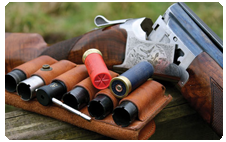 LANCASHIRE CONSTABULARY has finished towards the bottom of a firearms licensing performance table published by the UK’s largest shooting organisation.
LANCASHIRE CONSTABULARY has finished towards the bottom of a firearms licensing performance table published by the UK’s largest shooting organisation.
Lancashire takes an average of 195 days to issue firearm and shotgun certificates to new applicants – second to bottom of the table – while the best performing force in England and Wales takes just 20 days to complete the checks and issue the paperwork that allows a holder to buy and use a shotgun.
The UK’s largest shooting organisation claims the time taken for firearms licensing is a postcode lottery after compiling a national performance database which shows as much as a 28-fold difference between police forces.
The inconsistency of service has been highlighted by a ground-breaking BASC study which found that to renew a shotgun certificate in Suffolk can take just eight days but in Kent it could take 225 days. Applicants can expect to wait the best part of a year for a firearm certificate grant in Essex although it will be delivered in under a month in Leicestershire.
BASC has now written to Lancashire Constabulary Chief Constable Steve Finnigan to outline its findings.
Bill Harriman, BASC’s director of firearms, said: “The inconsistency of service is of significant concern. Processing times are a complete postcode lottery from one police force to the next. Lancashire Constabulary is among the worst performing forces across three of the five categories of our study and this should be a worry for the force.”
BASC set out to build a national firearms licensing performance database covering every police force in England and Wales after being told that neither individual police forces nor the Home Office publish such performance data.
BASC’s research shows the mean average for a section 1 grant to be 91 days; 88 days for a section 2 grant; 70 days for a section 1 renewal; 67 days for a section 2 renewal; and 26 days to issue a variation.
Forty-three police forces were contacted and those who didn’t give information were issued Freedom of Information Act requests. Some have still not surrendered the information despite their statutory obligation to do so.
BASC has ranked average processing times between forces using a traffic light system. Figures (as of 2nd March 2017) indicate the average number of calendar days taken to process each application type. Colours categorise relative performance with green fields representing high relative performance, yellow average relative performance and red relatively low performance. “N/A” may mean the force had the information, but refused to answer, that it isn’t recording all data across the parameter, or that it records the information in an inaccessible way such as holding individual paper records.
BASC’s full-time specialist firearms team dealt with more than 10,000 calls and queries last year – its busiest year on record – and delays in the licensing process were undoubtedly the biggest concern for members.
Bill Harriman added: “In the absence of data from the Home Office and individual police forces, the aim of this research was to establish a baseline of licensing performance.
“Our firearms team is told every day of anecdotal evidence which suggest some forces are light years ahead of others in how efficiently they process applications. Now we have figures to back the groundswell of opinion that many people within the shooting community are being let down depending on where in the country they live.
“This evidence-based process now allows us to publicly identify forces at either end of the performance spectrum. Clearly, the best performing police forces can show the worst forces the way to improve.
“It is in the interests of public safety for the licensing process to work as efficiently as possible. Applicants and certificate holders pay for the service and have a right to expect that service to be as quick and efficient as it can be.
“It is simply not acceptable that for example, while one force can take eight days to renew a shotgun certificate, another can take up to 31 weeks more to complete the same process. That suggests a serious failure in their procedures and is a risk to public safety.”
BASC sought to establish lines of communication with the licensing portfolio holder of each police force so that deficiencies could be brought to their attention and improvements encouraged.